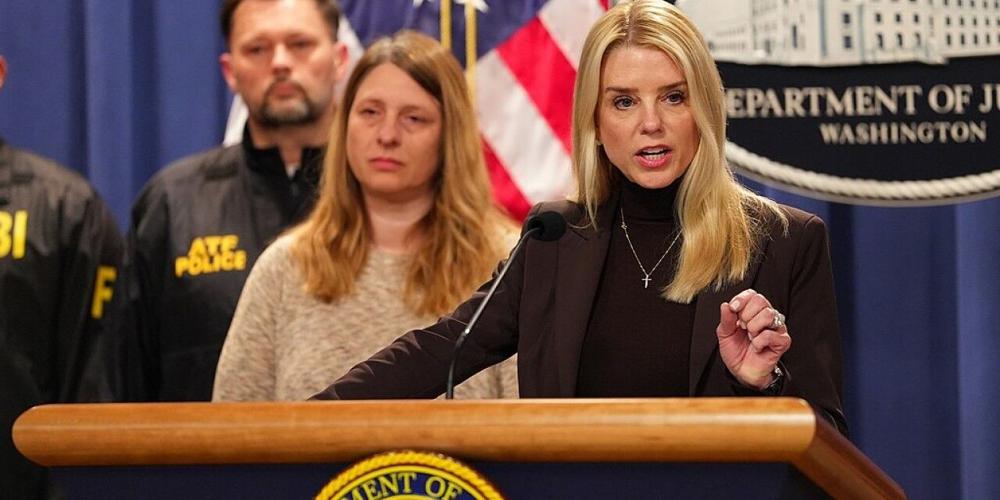
U.S. Attorney General Pam Bondi
CHICAGO - Calling Illinois' take on its new "workplace privacy" law "absurd," the Justice Department has told a federal judge the courts must block Illinois Democrats from again interfering with federal immigration enforcement efforts, this time by using the new state law to frighten employers away from using the E-Verify system to determine if their workers are authorized to work in the U.S.
On July 14, the Justice Department filed a response to Illinois' attempt to dismiss the federal government's lawsuit, seeking to strike down an Illinois state law that the Justice Department says is not allowed under federal law, as it imposes new restrictions and new threats on Illinois employers who use E-Verify, which federal law encourages them to do.
The new state law, known as SB0508, was enacted nearly a year ago by the state's Democratic governing supermajority and signed into law by Gov. JB Pritzker, also a Democrat. The law took effect in January 2025.
Nominally, SB0508 authorized revisions to Illinois' so-called "Right to Privacy in the Workplace Act."
Functionally, however, SB0508 created new regulations governing how employers can treat suspected illegal immigrants who apply for jobs or who may already be on their workforces.
Under the language added to the Illinois workplace privacy law by SB0508, for instance, employers in Illinois would be forbidden from imposing "work authorization verification ... requirements greater than those required by federal law."
The state law requires employers to provide at least seven days notice to workers before immigration or labor officials inspect the federal I-9 work authorization forms the company is required to keep on file for its workers.
And the law forbids employers from taking any "adverse employment action" against a worker, even after learning of a potential violation, until the Social Security Administration or the Department of Homeland Security provides the employer with a "final notice" that they cannot confirm the worker is eligible to work legally in the country.
Employers who are accused of violating the law could face lawsuits from workers and enforcement actions from the Illinois Department of Labor. Penalties could run up to $5,000 for a first violation and up to $10,000 for later violations.
The wording of the law and its likely effects have led critics of the legislation, including the Justice Department under President Donald Trump, to blast the law as a clever attempt to continue shielding illegal immigrant workers and complicating federal immigration enforcement in Illinois.
Should employers choose to follow federal law, the state could penalize them. But if they opt to abide by state law, they face the risk of penalties from the federal government.
Under federal law, every employer in the U.S. is allowed to use the E-Verify system, operated by the U.S. Citizenship and Immigration Services, to screen job applicants and workers to determine their eligibility to work.
Federal law requires employers to verify their workers are legally authorized to work. Employers who knowingly hire illegal immigrants or others without proper documents or work authorization could face massive and potentially business-threatening penalties.
These can include fines of $3,000 per worker if federal immigration and labor officials establish employers failed to verify I-9s, and penalties of $16,000 per worker if it is determined they knowingly hired those ineligible to work in the U.S.
Employers can also face jail time.
The action marked the second time in a little over 15 years that the federal government and Illinois have clashed in court over attempts by Illinois Democrats to regulate the use of E-Verify.
In 2009, a federal judge blocked an Illinois state law which had outright prohibited Illinois employers from using E-Verify, as state officials claimed the system was too inaccurate. A federal judge agreed the state had trespassed on the federal government's legal turf and unconstitutionally attempted to interfere with immigration enforcement.
In the new action, the Justice Department asserted SB0508 represents a more sly attempt to accomplish much the same goal, in a bid by Illinois Democrats to provide sanctuary to illegal immigrants.
Illinois Democrats, including Pritzker and Illinois Attorney General Kwame Raoul, have been among some of the loudest and most persistent critics of efforts by the Trump administration to locate and deport illegal immigrants in the U.S.

Illinois Attorney General Kwame Raoul
In June, Raoul's responded to the new lawsuit by asking the court to dismiss the Justice Department's action. In that motion, the state asserted SB0508 was not intended to undermine immigration enforcement efforts.
Raoul's office said SB0508 was intended to protect American citizens and immigrants legally authorized to work in the U.S. from being falsely identified as illegal immigrants.
The state argued the law fell within the state's constitutional authority to enact labor laws governing the treatment of workers.
A ruling to the contrary, Raoul's office argued, would empower the federal government to cite the cause of immigration enforcement to undo virtually any state law regulating workplaces.
In the Justice Department's response, the federal lawyers called Illinois' attempt to downplay the effects of SB0508 "both inaccurate and misleading."
They said a proper reading of the state law and how it would interact with federal law reveals SB0508 would almost certainly dissuade employers from using E-Verify, by imposing additional rules on employers using that system, when Congress has not.
Under the legal framework established under the federal Immigration Reform and Control Act (IRCA) and its successors, Congress clearly intended all U.S. employers to be free to use E-Verify, without threat of reprisal, no matter the state in which they may be located, the Justice Department said.
The new Illinois law "does not simply regulate employment practices generally; it directly and expressly targets how employers use federal immigration verification systems and penalizes employers for actions related to their use," the Justice Department wrote.
"Congress designed IRCA to establish a comprehensive and exclusive framework for employment eligibility verification. The challenged provisions squarely undermine that scheme."
The Justice Department noted the law could even be read still more stringently, potentially leaving employers at risk from using E-Verify at all.
They noted SB0508 "expressly states that '[a]n employer shall not impose work authorization verification or reverification requirements greater than those required by federal law.'”
Since only federal contractors are required by federal law to use E-Verify, SB0508 could be read to ban all other employers from using E-Verify or face the risk of state enforcement actions.
"Participation in E-Verify requires adherence to federally prescribed steps—again underscoring Congress’s intent to control the entire process by which eligibility is confirmed," the Justice Department wrote.
"This comprehensive structure reflects Congress’s intent to occupy the field. Yet Illinois is attempting to highly regulate the use of this system—if not outright ban it."
The Justice Department urged the court to grant the federal government's request for a preliminary injunction blocking the Illinois law and reject Illinois' attempt to dismiss the lawsuit.
U.S. District Judge Sharon Johnson Coleman has not yet ruled in the matter, as of July 21.
Coleman was appointed to the bench in 2010 by former President Barack Obama.










